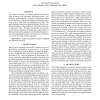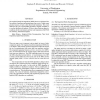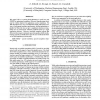ICASSP
2008
IEEE
15 years 7 months ago
2008
IEEE
We attempt to quantify the possible gains that can be achieved by examining a rate-distortion competition between a conventional and a compressive sampling solution to data rate r...
ICASSP
2008
IEEE
15 years 7 months ago
2008
IEEE
104
click to vote
ICASSP
2008
IEEE
15 years 7 months ago
2008
IEEE
We propose novel approaches for optimizing the detection performance in spoken language recognition. Two objective functions are designed to directly relate model parameters to tw...
106
click to vote
ICASSP
2008
IEEE
15 years 7 months ago
2008
IEEE
The empirical mode decomposition (EMD) has seen widespread use for analysis of nonlinear and nonstationary time-series. Despite some practical success, it lacks a firm theoretica...
ICASSP
2008
IEEE
15 years 7 months ago
2008
IEEE
In this paper, an efficient method for language model lookahead probability generation is presented. Traditional methods generate language model look-ahead (LMLA) probabilities fo...
ICASSP
2008
IEEE
15 years 7 months ago
2008
IEEE
Drawing on recent progress in auditory neuroscience, we present a novel speech feature analysis technique based on localized spectrotemporal cepstral analysis of speech. We procee...
ICASSP
2008
IEEE
15 years 7 months ago
2008
IEEE
In this paper we present a new adaptive short-time Fourier analysissynthesis scheme and demonstrate its efficacy in speech enhancement. While a number of adaptive analyses have p...
ICASSP
2008
IEEE
15 years 7 months ago
2008
IEEE
This paper looks at a parsing-based alternative to word error rate (WER) for optimizing recognition, SParseval, hypothesizing that it may be a better objective for applications su...
ICASSP
2008
IEEE
15 years 7 months ago
2008
IEEE
This paper considers the problem of obtaining an accurate spectral representation of speech formant structure when the voicing source exhibits a high fundamental frequency. Our wo...
ICASSP
2008
IEEE
15 years 7 months ago
2008
IEEE
Audio segmentation has received increasing attention in recent years for its potential applications in automatic indexing and transcription of audio data. Among existing audio seg...



